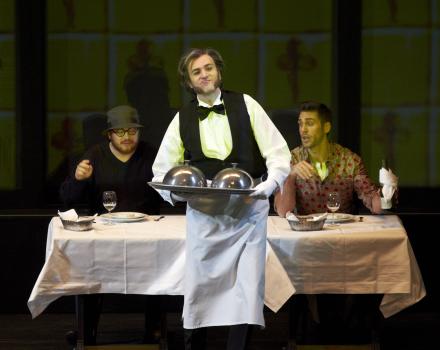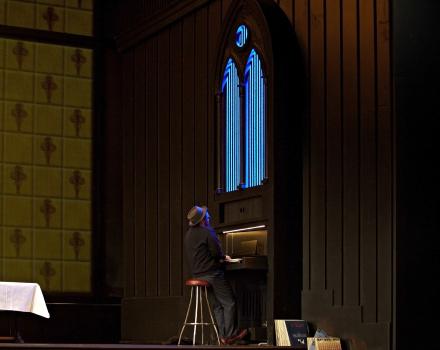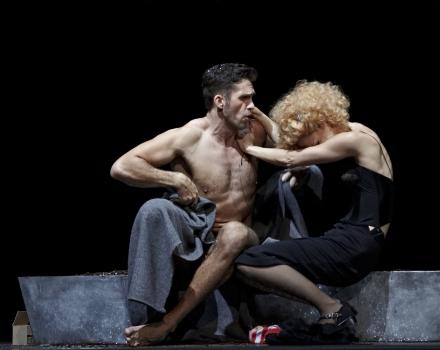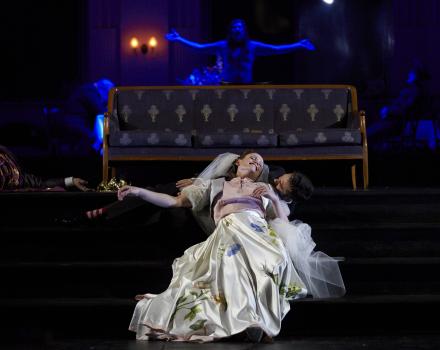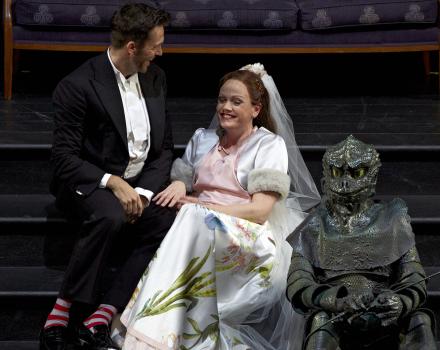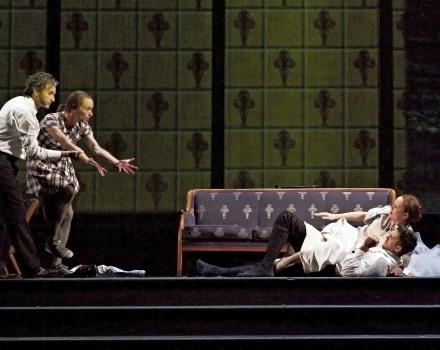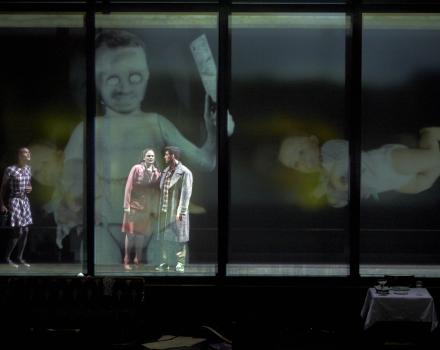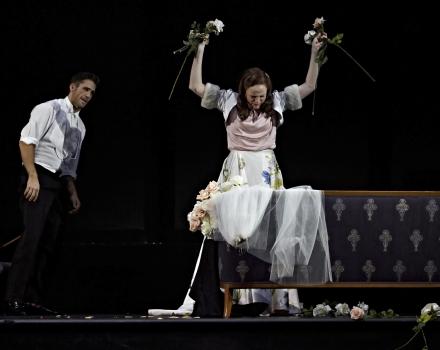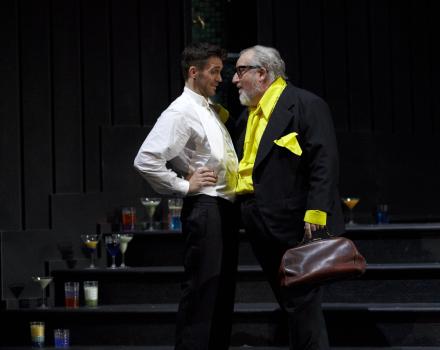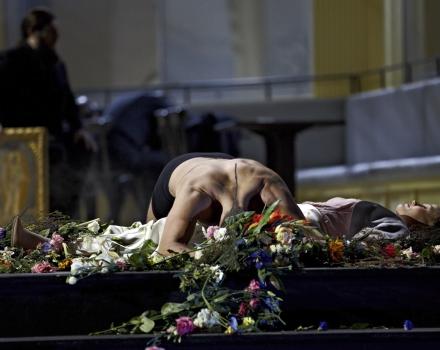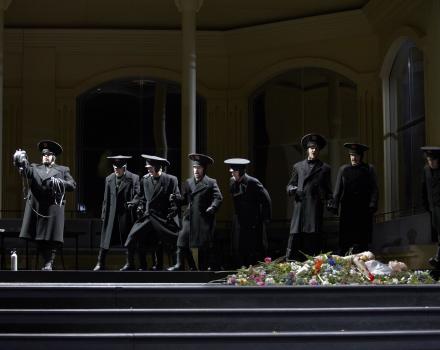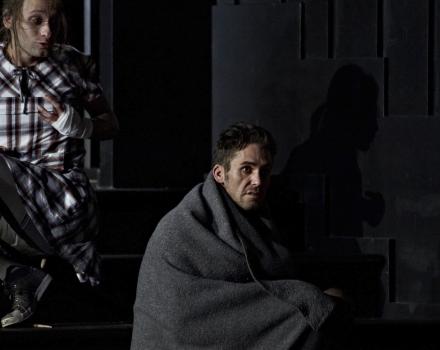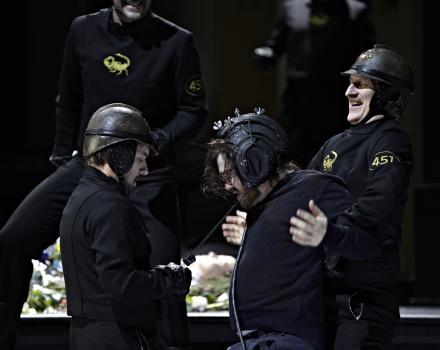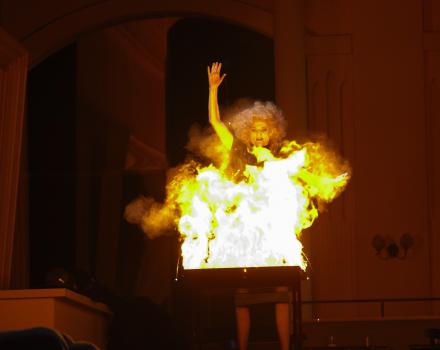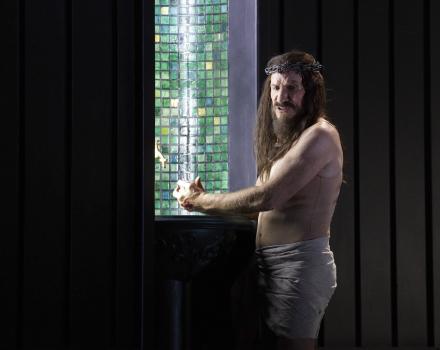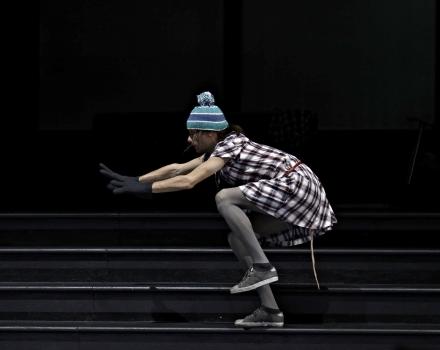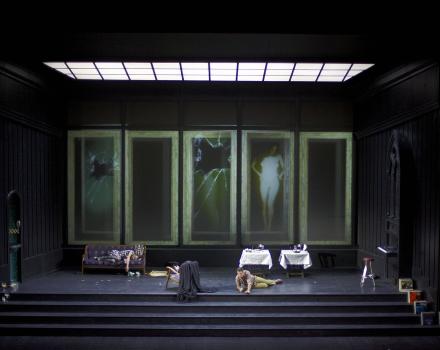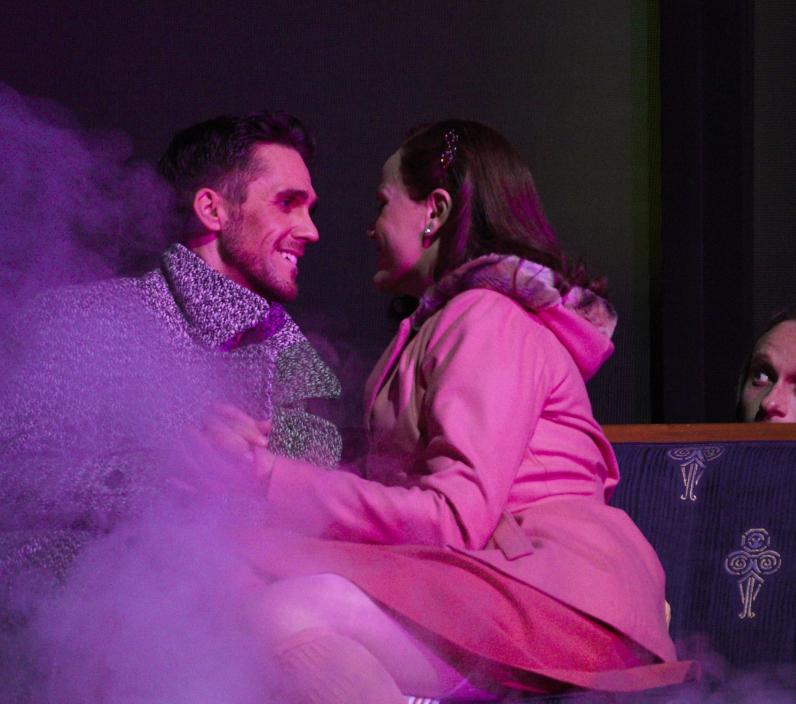

L'Écume des jours

There is Colin. And there is Chloé.
There is Chick. And there is Alise.
There is Nicolas with his magical piano-cocktail.
There is the philosopher Jean-Sol Partre, and the little grey mouse, and there is post WWII Paris, and there is jazz.
And then there is the ominous waterlily, growing in Chloé’s lung.
"Only two things count in life: loving pretty girls and the music of Duke Ellington" – Colin
Cast
Colin | Ed Lyon |
|---|---|
Chloé | Rebecca von Lipinski |
The Mouse | Sébastien Dutrieux |
Nicolas | Arnaud Richard |
Chick | Daniel Kluge |
Alise | Sophie Marilley |
Isis | Nozuko Teto |
The Clergyman / Pégase / Seneschal | Marcel Beekman |
Coriolan | Padraic Rowan |
Pangolin / The Pharmacist | Dirk Schmeding |
Doctor Mangemanche | Roland Bracht |
Director of the plant | Karl-Friedrich Dürr |
The Girl | Jeanne Seguin |
Jesus | Mark Munkittrick |
The Cat | Manja Kuhl |
Chorus | Staatsopernchor Stuttgart |
Orchestra | Staatsorchester Stuttgart |
| ... | |
Music | Edison Denisov |
|---|---|
Conductor | Sylvain Cambreling |
Director | Jossi Wieler, Sergio Morabito |
Sets | Jens Kilian |
Lighting | Reinhard Traub |
Costumes | Anja Rabes |
Text | Edison Denisov |
Chorus Master | Johannes Knecht |
| ... | |
Video
The story
There is Colin. And there is Chloé.
There is Chick. And there is Alise.
There is Nicolas with his magical piano-cocktail.
There is the philosopher Jean-Sol Partre, and the little grey mouse, and there is post WWII Paris, and there is jazz.
And then there is the ominous waterlily, growing in Chloé’s lung.
The action takes place in Paris in the aftermath of WWII. There is a new sense of freedom that pervades the city: everything is possible, no matter how surreal. Parisian youth are bursting with joie de vivre, they want to party, to listen to jazz, to fall in love.
Young and wealthy Colin is no exception to this (ʽAh! Comme la vie serait triste si l'on ne pouvait pas chanter!ʼ) He has dinner with his friend Chick, during which his butler Nicolas shows off his contraption the piano-cocktail, which prepares cocktails inspired by the music played. During dinner he confides to Chick that he has dreamt of a girl he wants to meet. Chick wants to fall in love too: he has met Alise, Nicolas’ niece, at a conference by Jean-Sol Partre (a pun on the notorious philosopher).
The next day at the skate rink, Chick and Colin meet Alise and Isis, who invites them to her dog’s birthday celebration (ʽNe vous mariez pas, les filles!ʼ) Alise makes clear to Chick that she intends not to marry him because he is too obsessed with Partre. At the party Colin meets Chloé, whom he recognises as the girl of his dream. Colin and Chloé escape the party to walk through the city, and then take a ride on a pink cloud that shields them from being seen from other people. They fall in love (ʽChloé, vos lèvres sont doucesʼ).
Chloé, Alise and Isis prepare for the wedding; everyone is bursting with joy and love.
This happiness, however, won’t last long.
While Colin and Chloé leave are on their honeymoon, Chloé has a vision of monsters, dirt and smoke. Back in Paris, she complains about a pain in her chest. The house starts behaving bizarrely, too: the tiles have trouble breathing and the walls seem to have started shrinking. The doctor delivers a fatal diagnosis: Chloé has a waterlily growing in her lung. The only possible cure is to constantly surround the lily with prettier flowers so that she won’t grow bigger. At Chloe’s sickbed, Colin consoles her by reading a novel about Tristan and Isolde (ʽEt Iseut s'écrie: Hélasʼ).
To pay for the mounting flower bills, Colin ends up working at the military factory, where he grows weapons from seeds. Meanwhile, Chloé is not getting better. Alise enters the flower-packed room and informs Colin that Chick has spent all his money on Jean-Sol Partre books, and that he wants to leave her.
Policemen go to Chick’s house to confiscate his property; a fight ensues, in which Chick dies defending his books. Desperate Alise sets fire to the bookshops showcasing books by Jean-Sol Partre, and Paris is on fire.
Chloé is dead. Colin is in despair. He discusses with Jesus nailed to the cross the futility of all these deaths (ʽAgnus Deiʼ). The house mouse wants out too and ask the cat for help, but the cat is unconvinced (ʽVraiment, ça ne m'intéresse pas énormémentʼ). A blind girl walking down the streets steps on the cat’s tail: the cat shuts its mouth around the mouse’s head.
Insights
Published in 1947, Boris Vian’s novel L’Écume des Jours (ʽFroth on the Daydream’) has captured the hearts and imagination of every generation since. The story has been transposed several times to cinema (recently, by acclaimed French cinematographer Michel Gondry), to the stage, and finally to opera by the Soviet composer Edison Denisov in 1981.
The story in itself is deceptively simple: much like Puccini’s La Bohème, L’Écume tells a story of young, Bohemian people that ends in tragedy. Like Mimì or Violetta from Traviata, Chloé suffers a fatal illness in her lungs. At first, the opera is joyous and filled with the vital impetus of the protagonists, but as the tragedy approaches, it becomes darker and darker. Wealthy Colin, who seems to have it all at the beginning, loses it all attempting to cure his beloved Chloé. Chick also loses it all, and Alise goes down with him. Even the house mouse will have to sacrifice herself…
It is the poetic and fantastical imagery inhabiting the world of L’Écume that makes it so unique and moving: engineers earning less than construction workers; a mechanical rabbit making pills; pink clouds; speaking mice, and shrinking houses. This total narrative freedom was fertile ground for avant-garde Denisov, who was looking to expand his musical world beyond the imposed lines of ʽSocialist Realismʼ.
Denisov had a longstanding fascination with Western European music and with French music and culture in particular. L’Écume des Jours was not the first piece by Vian that Denisov had decided to set to music: in 1973 he wrote the cantata La Vie en Rouge based on the poem with the same name. This attraction had made him persona non grata in his own country, where in 1979 he was blacklisted for unapproved participation in some festivals of Soviet music in the West. While he retained a relationship with Russian music, its composers and motifs, he found a second home in Paris, where his opera was premiered in 1986 at the Opéra-Comique.
Denisov’s dual artistic citizenship is very apparent in the musical construction of L’Écume des jours, with large liturgical choruses of Russian inspiration giving the way to jazzy motives, homages to Wagner’s Tristan und Isolde and to the sound of zvon, the Russian chiming bells.
Since its premiere in 1986, the opera has been performed only rarely. OperaVision and Oper Stuttgart provide a rare opportunity to see it in its entirety. Oper Stuttgart’s directing team Jossi Wieler and Sergio Morabito bring out the contemporary drama in a work that moves freely between avant-garde musical styles, musical, opera and jazz.
Gallery
